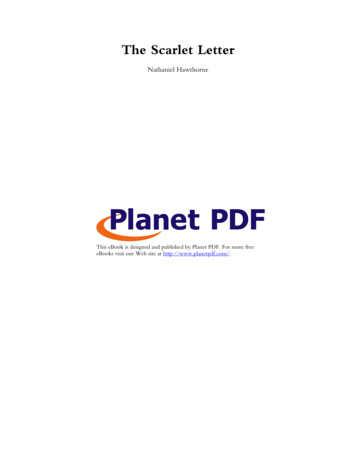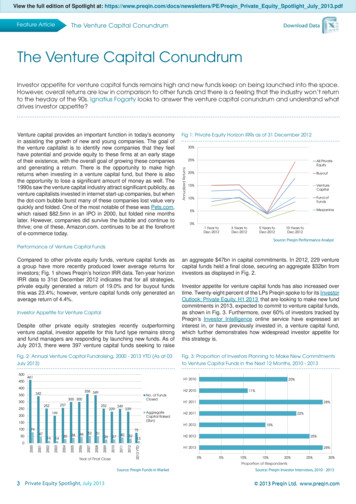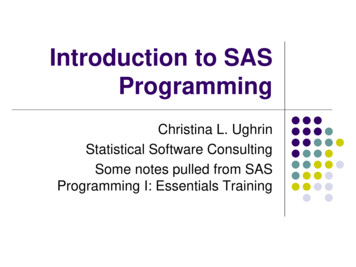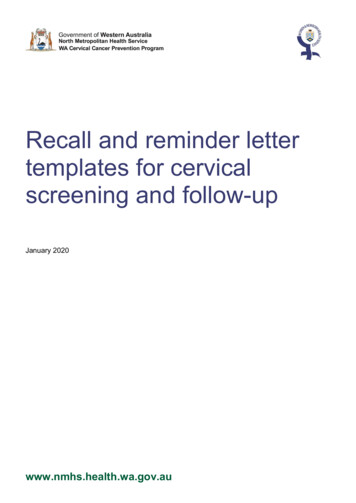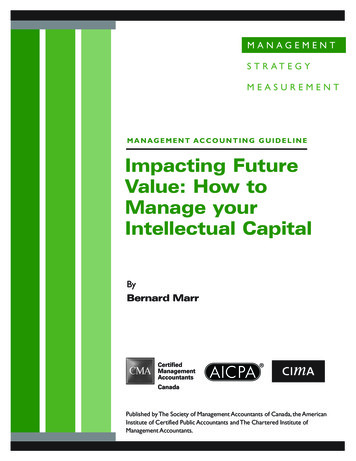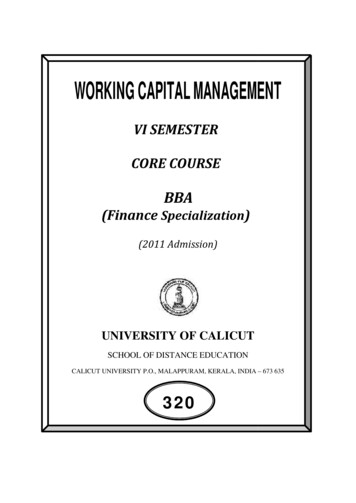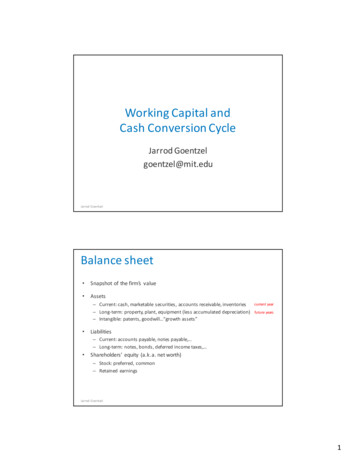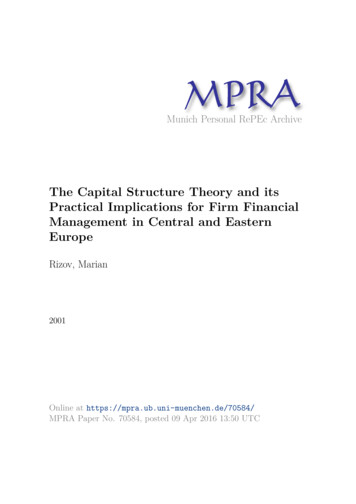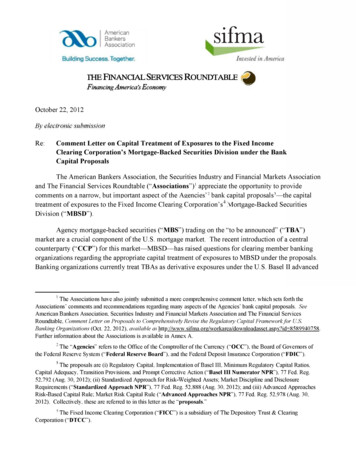
Transcription
AmericanBankersAssociation.sifma.THE FINANCIAL SERVICES ROUNDTABLE.October 22, 2012.Re:Comment Letter on Capital Treatment of Exposures to the Fixed IncomeClearing Corporation's Mortgage-Backed Securities Division under the BankCapital Proposals.The American Bankers Association, the Securities Industry and Financial Markets Association1.and The Financial Services Roundtable("Associations"),footnoteappreciatethe opportunity to providebank capitalproposals,footnote2.—the 3.capitalcomments on a narrow, but important aspect of theAgencies'.Footnote4.treatment of exposures to the Fixed Income itiesDivision ("MBSD").Agency mortgage-backed securities ("MBS") trading on the "to be announced" ("TBA")market are a crucial component of the U.S. mortgage market. The recent introduction of a centralcounterparty ("CCP") for this market—MBSD—has raised questions for clearing member bankingorganizations regarding the appropriate capital treatment of exposures to MBSD under the proposals.Banking organizations currently treat TBAs as derivative exposures under the U.S. Basel II advancedThe Associations have also jointly submitted a more comprehensive comment letter, which sets forth theAssociations' comments and recommendations regarding many aspects of the Agencies' bank capital proposals. SeeAmerican Bankers Association, Securities Industry and Financial Markets Association and The Financial ServicesRoundtable, Comment Letter on Proposals to Comprehensively Revise the Regulatory Capital Framework for U.S,Banking Organizations (Oct. 22, 2012), available at d 8589940758Further information about the Associations is available in Annex A.Endoffootnote.The "Agencies" refers to the Office of the Comptroller of the Currency ("OCC"), the Board of Governors ofthe Federal Reserve System ("Federal Reserve Board"), and the Federal Deposit Insurance Corporation ("FDIC").Endoffootnote.The proposals are (i) Regulatory Capital, Implementation of Basel III, Minimum Regulatory Capital Ratios,Capital Adequacy, Transition Provisions, and Prompt Corrective Action ("Basel III Numerator NPR"), 77 Fed. Reg.52,792 (Aug. 30, 2012); (ii) Standardized Approach for Risk-Weighted Assets; Market Discipline and DisclosureRequirements ("Standardized Approach NPR"), 77 Fed. Reg. 52,888 (Aug. 30, 2012); and (iii) Advanced ApproachesRisk-Based Capital Rule; Market Risk Capital Rule ("Advanced Approaches NPR"), 77 Fed. Reg. 52,978 (Aug. 30,2012). Collectively, these are referred to in this letter as the "proposals."Endoffootnote.The Fixed Income Clearing Corporation ("FICC") is a subsidiary of The Depository Trust & ClearingCorporation ("DTCC").Endoffootnote.
However,approaches rules.Footnote5. MBSD is regulated by the Securities and Exchange Commission("SEC'') as a CCP for cash transactions. Significantly, MBSD is not a derivatives clearingorganization regulated by the Commodity Futures Trading Commission ("CFTC").MBSD provides critical risk management, trade processing and market efficiencies andunderpins the vast majority of trading in the critically important TBA market. It is essential thatincentives to utilize MBSD be maintained, as the TBA market is the largest and most liquid marketfor mortgage finance in the United States.I.Market OverviewCurrently, most mortgages in the United States are securitized through the agency MBSmarket. The vast majority of agency MBS trading occurs in the forward market, which is known asthe TBA market. In a TBA trade, the seller of MBS agrees on a sale price, but does not specify whichparticular securities will be delivered to the buyer on settlement day. Instead, relying uponstandardized industry practices and "conforming" mortgage collateral, only a few basic characteristicsof the securities are agreed upon, such as the coupon rate and the face value of the bonds to bedelivered. This TBA trading convention enables an extremely heterogeneous market consisting ofthousands of different MBS pools backed by millions of individual mortgages to be reduced—fortrading purposes—to only a few liquid contracts. TBA prices, which are publicly observable, alsoserve as the basis for pricing and hedging a variety of other MBS that do not trade in the TBAmarket.Footnote6.A smaller but still significant portion of agency MBS trading volume occurs outside the TBAmarket. This is known as "specified pool'" trading ("SPT'') because the identity of the pool to bedelivered is specified at the time of the trade, much like other securities markets. While some ofthese pools are not eligible for TBA trading, many others trade outside the TBA market because theyare backed by loans with more favorable prepayment characteristics from an investor's point of view,allowing them to achieve a higher price.A key characteristic of the TBA and SPT markets is that they are forward markets. TBAtrades generally settle within three months, with volumes and liquidity concentrated in the two nearestmonths. To facilitate the logistics of selecting and delivering securities from the sellers' inventory,the Securities Industry and Financial Markets Association ("SIFMA") sets a single settlement dateeach month for each of several types of agency MBS. Depending on when it falls in the monthlycycle of settlements, the trade date will usually precede settlement by between 2 and 60 days.footnote7.See OCC. Federal Reserve Board. FDIC and OTS. Risk-Based Capital Standards: Advanced Capital AdequacyFramework — Basel II, 72 Fed. Reg. 69,288, 69,344 (Dec. 7. 2007) (emphasis added) ( 'U.S. Basel II AdvancedApproaches FinalRule").Endoffootnote.Page2.James Vickery and Joshua Wright. Federal Reserve Bank of New York. TBA Trading and, Liquidity in theAgency MBS Market. 2 (Staff Report No. 468, Aug. 2010), available athllp://www.ny.frb.org/research/staff te.
II.Overview of MBSD.MBSD was recently approved by the SEC to provide guaranteed settlement and CCP services8.for the TBA and SPT markets.FootnoteThe SECapproved MBSD's application to become a CCP in its roleoverseeing securities clearinghouses. The predecessor of the MBSD, the MBS Clearing Corporation,was also approved by the SEC as a Securities Clearing Agency over 30 years ago and functionedunder SEC regulation for that entire period.In its approval order, the SEC stated: 'The Commission believes that [changes to MBSD'srules to allow it to provide guaranteed settlement and CCP services] are consistent with the ExchangeAct, including Section 17A, because they should help facilitate the prompt and accurate clearance andsettlement of securities transactions and help assure the safeguarding of securities and funds underFICC's control or for which FICC is responsible. In particular, the Commission believes that thesechanges to the MBSD's rules should result in a more efficient system of settlement for the mortgagebacked security market."Footnote9.III.Existing U.S. Basel II Treatment of TBAsUnder the U.S. Basel 11 advanced approaches rules, banking organizations treat TBAs andSPTs as derivative exposures subject to the counterparty credit risk framework. This approach wasclarified in the preamble to the U.S. Basel II Advanced Approaches Final Rule, which stated:"A derivative contract is defined to include interest rate derivative contracts, exchangerate derivative contracts, equity derivative contracts, commodity derivative contracts,credit derivatives, and any other instrument that poses similar counterparty credit risksThe rule also defines derivative contracts to include unsettled securities, commodities,and foreign exchange trades with a contractual settlement or delivery lag that is longerthan the normal settlement period (which the rule defines as the lesser of the marketstandard for the particular instrument or five business days). This includes, forexample, agency mortgage-backed securities transactions conducted in the To-BeAnnounced market."Footnote10.This treatment of TBAs is uniquely specified in the U.S. implementation of the advancedapproaches under International BaselII,footnotereflecting11. the fact that the TBA product is unique to theU.S. marketSee SEC. Self-Regulatory Organizations; Fixed Income Clearing Corporation: Order Approving AmendedProposed Rule Change to Allow the Mortgage-Backed Securities Division To Provide Guaranteed Settlement and Centra!CounterpartyServices,77Fed. Reg. 15,155 (Mar. 14. 2012).Endoffootnote.Page3.Id. at 15,162 (emphasis added).Endoffootnote.See U.S. Basel II Advanced Approaches Final Rule at 69.344 (emphasis added).Endoffootnote."International Basel II" refers to the international capital accord reached by the Basel Committee on BankingSupervision ("Basel Committee") in International Convergence of Capital Measurement and Capital Standards: A.Revised Framework (June 2006). available at http://www.bis.org/publ/bcbs 128.pdf.Endoffootnote.
IV.Basel III Treatment of Exposures to CCPs.12.In the context of International Basel III,footnotethe BaselCommittee has developed a framework forthe capitalization of bank exposures to CCPs, which the Agencies have proposed to implement in theThe frameworkapplies to banking organizations' "exposures to centralUnited States.Footnote13.counterparties arising from OTC derivatives, exchange traded derivatives transactions and [securitiesfinancing transactions].'' footnote14.The frameworkspecifically does not apply to banking organizations'"exposures an sing from the settlement of cash transactions (equities, fixed income, spot FX and spotcommodities)."Footnote15.Under the Basel Committee's framework, exposures to qualifying CCPs ("QCCPs") generallyreceive more beneficial capital treatment than exposures to non-QCCPs. In order to be considered aQCCP, a clearinghouse must meet a number of requirements. Among other things, the clearinghousemust be licensed as a CCP and permitted to operate as such by a supervisor that substantially enforces16.and mustcomplete "hypotheticalthe CPSS-IOSCO Principles for Financial MarketInfrastructures,footnotecapital calculations" as described in the framework. If a clearinghouse is a non-QCCP, bankingorganizations must apply the Basel capital accords' standardized approach to credit risk for their tradeexposures to the clearinghouse and must assign a 1,250 percent risk weight to default fundcontributions to the clearinghouse.V.Treatment of Exposures to MBSDThe Associations request that the Agencies clarify the appropriate capital treatment ofexposures to MBSD under the proposals. As a preferred alternative, the Agencies should clarify thatexposures to MBSD will not be subject to the proposed cleared transaction framework for exposuresto derivatives CCPs. Instead, banking organizations should treat MBSD as a securities CCP. Thisclarification would: Align with MBSD's role as a securities clearinghouse; Align with MBSD's recent regulatory approval from the SEC as a securities CCP; Reflect the unique nature of the TBA / SPT market; and Provide much needed clarity to market participants."International Basel III" refers to the international capital accord reached by the Basel Committee in BaselIII:A Global Regulatory framework for More Resilient Banks and Banking Systems (Revised June 2011). available athttp://www.bis.org/publ/bcbsl89.pdf. End of footnote. Page 4.See Basel Committee, Capital Requirements far Bank Exposures to Central Counterparties (July 2012),available at d. at 4.Endoffootnote.See Committee on Payment and Settlement Systems ("CPSS") and Technical Committee of the InternationalOrganization of Securities Commissions ("IOSCO"'), Principles for Financial Market Infrastructures (Apr. 2012)available te.
Even if exposures to MBSD are subject to the proposed cleared transaction framework forderivative CCPs there are still concerns regarding the proposed application of the current exposuremethod ("CEM") to determine a QCCP's hypothetical capital requirement.Page5.Given the large scale ofthe TBA market, applying a non-zero conversion factor to TBAs and SPTs under the CEM wouldlikely result in a very large hypothetical capital requirement that would, in turn, give rise tosignificant capital charges for MBSD default fund exposures. This could have an adverse impact onthe U.S. mortgage market by deterring clearing member banking organizations from participating inMBSD.Should the Agencies decide to subject exposures to MBSD to the proposed cleared transactionframework, the Associations believe that a zero conversion factor should be applied under the CEMfor purposes of determining MBSD's hypothetical capital. Specifically, because TBA exposures areprimarily subject to interest rate risk and the contract's maturity is always less than one year, theAssociations believe that the most appropriate conversion factor to use in performing MBSD'shypothetical capital calculation is the zero percent conversion factor applicable to short-term interest17.The Associationsunderstand that applying such a conversion factor would giverate derivatives.Footnoterise to a very low or de minimis hypothetical capital requirement for MBSD given MBSD's variationmargining arrangements, implying that application of the International Basel III rules for derivativeCCPs to banking organizations' exposures to MBSD would not yield meaningful prudentialenhancements in terms of clearing member banking organization capital requirements.The U.S. Basel II Advanced Approaches Final Rule applies a zero conversion factor to interest rate contractswith one year or less residual maturity. See U.S. Basel II Advanced Approaches Final Rule at 69,414. See also AdvancedApproaches NPR .132(c), Table 3 (Conversion Factor Matrix forOVER-THE-COUNTERDerivative Contracts).Endoffootnote.
The Associations thank the Agencies for considering the comments and recommendations setforth in this letter.Page6.If you have any questions or need further information, please do not hesitate tocontact:Hugh C. Carney, Senior Counsel, American Bankers Association at 202-663-5324(email: hcarney@aba.com);Beth Knickerbocker, Senior Counsel and Vice President, American Bankers Association at 202663-5042 (email: bknicker@aba.com);Kenneth E. Bentsen, Jr., Executive Vice President, Public Policy and Advocacy, SecuritiesIndustry and Financial Markets Association at 202-962-7400 (email: kbentsen@sifma.org);Carter McDowell, Managing Director and Associate General Counsel, Securities Industry andFinancial Markets Association at 202-962-7327 (email: cmcdowell@sifma.org);Chris Killian, Managing Director - Securitization, Securities Industry and Financial MarketsAssociation at 212-313-1126 (email: ckillian@sifma.org); orRichard Foster, Senior Counsel for Regulatory and Legal Affairs, The Financial ServicesRoundtable at 202-589-2424 (email: Richard.Foster@fsround.org).Respectfully submitted, signed.Hugh C. Carney.Senior Counsel.American Bankers Association.Kenneth E. Bentsen, Jr.Executive Vice President.Public Policy and Advocacy.Securities Industry and Financial Markets Association.Richard M. Whiting.Executive Director & General Counsel.The Financial Services Roundtable.
Addressees:page7.Ms. Jennifer J. Johnson, Secretary.Board of Governors of the Federal ReserveSystem.20th Street & Constitution Avenue, N W .Washington, D C. 2 0 5 5 1.Mr. Robert E. Feldman, Executive Secretary.Federal Deposit Insurance Corporation.550 17th Street, N W .Washington D C. 2 0 4 2 9.Office of the Comptroller of the Currency.250 E Street, S W .Mail Stop 2-3.Washington, D C. 2 0 2 1 9.
ANNEXA.Page8.About the Associations.The American Bankers Association represents banks of all sizes and charters and is thevoice for the nation's 14 trillion banking industry and its 2 million employees. Learn moreat www.aba.com.SIFMA brings together the shared interests of hundreds of securities firms, banks andasset managers. SIFMA's mission is to support a strong financial industry, investor opportunity,capital formation, job creation and economic growth, while building trust and confidence in thefinancial markets. SIFMA, with offices in New York and Washington, D.C., is the U.S. regionalmember of the Global Financial Markets Association. For more information,visit www.sifma.org.The Financial Services Roundtable represents 100 of the largest integrated financialservices companies providing banking, insurance, and investment products and services to theAmerican consumer. Member companies participate through the Chief Executive Officer andother senior executives nominated by the CEO. Roundtable member companies provide fuel forAmerica's economic engine, accounting directly for 92.7 trillion in managed assets, 1.2 trillionin revenue, and 2.3 million jobs. For more information, visit The Financial ServicesRoundtable's website at www.fsround.om.
The Fixed Income Clearing Corporation ("FICC") is a subsidiary of The Depository Trust & Clearing Corporation ("DTCC"). End of footnote. Mortgage-Backed Securities Division ("MBSD"). Agency mortgage-backed securities ("MBS") trading on the "to be announced" ("TBA") market are a crucial component of the U.S. mortgage market.
